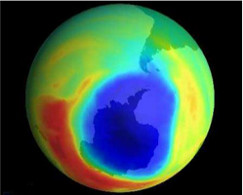 |

In 1990, the Parties to the Montreal Protocol established the Multilateral Fund for the Implementation of the Montreal Protocol in order to assist developing countries to achieve their compliance commitments with regard to the elimination of production and consumption of harmful ozone substances. The Fund finances technology conversions, technical assistance, institutional strengthening, training and information projects in 147 developing countries (defined as "Article 5 Countries" under the Protocol). Since its establishment to date, the Fund has approved activities worth over US $3.6 billion, eliminating more than 488,909 metric tons of harmful ozone substances through more than 7,000 projects.
The Fund is supported by 49 industrialized countries, including Italy, on a three-year basis. For the three-year period 2015-2017, the Fund's financial availability amounts to $507.5 million. Italy contributed to the Fund budget, for the 2015-2017 period, with $ 26,967,753.30 (€6,559,157.00 per year). The portion of the Italian contribution to the Fund replenishment is established on the basis of the UN-level scale of contribution. In the current triennium 2018-2020, the Multilateral Fund replenishment budget amounts to $ 540 million, and Italy’s share of contribution is equivalent to $ 28,336,500 (€ 8,751,822 per year).
Italy also participates in the Multilateral Fund’s Executive Committee, which is the body that develops and monitors the project financing guidelines, promotes operational policies and oversees their implementation, and manages the Fund's resources by establishing its delivery arrangements.
The Executive Committee and the Multilateral Fund Secretariat operate through four international implementing agencies: UNIDO (United Nations Industrial Development Organization), UNEP (United Nations Environment Program), UNDP (United Nations Development Program), the WORLD BANK and also through some bilateral agencies, including Italy. Such agencies ensure the implementation on the ground of the project activities approved by the Multilateral Fund for each developing country.
The projects financed by the Multilateral Fund must be based on the "Ozone Depleting Substances Phase Out Program", that each developing country must arrange in order to receive funding.
All projects are presented by the developing country itself, with the support of the implementing agencies. If the projects comply with existing guidelines and procedures, they are submitted to the Executive Committee for approval. The projects’ implementation (from the start-off to the project completion) is borne by the agencies themselves.
It should be recalled that the Fund only pays project incremental costs, established according to the rules set out by the Executive Committee for each sector of application. These costs represent the additional cost of conversion, related to the "environmental performance": substantially, the incremental costs are the additional costs associated with choosing one technology for its best environmental characteristics with respect to one another.
In the present phase, the Fund activities focus on the financing of the reduction and phase out schedule of hydrochlorofluorocarbons (HCFCs) adopted under the Montreal Protocol. It should also be noted that, in the context of the international negotiations under the Kigali Amendment to Montreal Protocol adopted on October 2016, hydrofluorocarbons (HFCs) are going to be included among the substances subject to progressive reduction since, even though they do not have a depleting effect on the ozone layer, they have a strong global warming potential.
Italian companies that stand out for innovative environmental technologies replacing HCFC and/or leapfrogging HFCs can therefore internationalize their know-how by becoming providers of the United Nations' Implementing Agencies.
In fact, the Agencies implementing industrial conversion projects, approved by the Multilateral FundExecutive Committee , usually disseminate international procurement notices on their websites in order to purchase the equipment, components and technical assistance services they need for the replacement of ozone-depleting technologies. Therefore, when companies or other potentially interested Italian entities wish to participate in procurements and bids linked to projects funded by the Multilateral Fund for the Implementation of the Montreal Protocol, it is suggested to constantly monitor the following web sites:
• United Nations Development Program (UNDP): http://procurement-notices.undp.org . Given the high number of notifications on several sectors, it is particularly recommended to monitor mainly through key words such as "HCFC", "HPMP" in the "pollution" and/or "consultants" sectors;
• United Nations Industrial Development Organization (UNIDO): http://www.unido.org/en/procurement/notices.html. It is recommended to consult the UNIDO "Procurement Portal" (https://procurement.unido.org) for which it is mandatory to register as bidders by clicking "request bidder account ";
• World Bank: http://www.worldbank.org/projects . Given the high number of notifications on a variety of sectors, it is particularly advisable to monitor primarily through keywords such as "HCFC", "HPMP", "Montreal";
• United Nations Environment Program (UNEP): http://www.unep.org/ietc/Procurement/tabid/104300/Default.aspx . In order to access the UNEP bids, it is mandatory to register on the UNEP official suppliers’ list. All information can be found on the site.
Contacts
Cristiano Piacente
AT Sogesid
peru.alessandro@mase.gov.it
c.piacente@sogesid.it
Tel. (+39) 06 5722 8143
Federico Mannoni
AT Sogesid
mannoni.federico@mase.gov.it
f.mannoni@sogesid.it
Tel. (+39) 06 5722 8148



